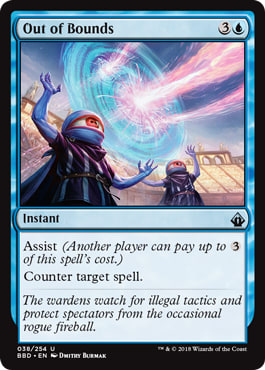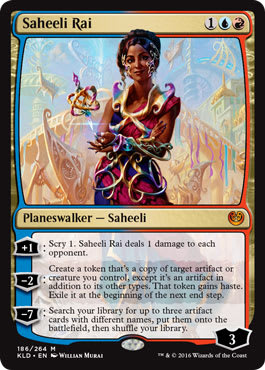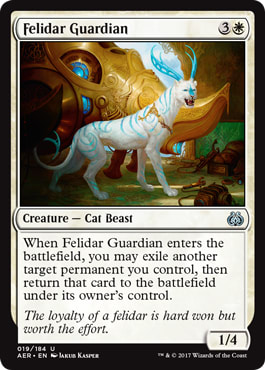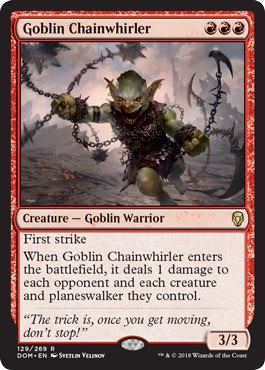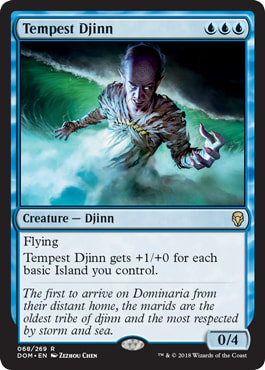Battlebond gave us a great new multiplayer mechanic called "Assist," which allows other players to help pay costs for your spells. It's clearly designed for team play, where you've always got someone who wants to help you out.
But what if your group doesn't like team play? What if your great love is traditional chaos multiplayer -- a singular struggle where many people enter, one person leaves! Is it worth putting Assist cards in your deck then?
It is, as long as you're willing to sell the card's value to your opponents.
By putting Assist cards into a non-team deck, what you're saying is, "I bet this spell is so useful to people that someone else will help me cast it when I'm mana-screwed or tapped out."
But here's the problem with that: you have to convince your opponents that it's in their best interests to spend their mana to affect the board state. Sometimes that sell will be extremely easy -- "Sarah will win the game if that spell resolves, I only have one island open, will you pay 3 mana for this Out of Bounds to help me counter it?"
That is one impactful counterspell! But you have now wandered into Magical Christmasland -- designing decks for a wonderful world where nothing goes wrong. In Magical Christmasland you never get shorted on mana, always curve out, always draw that piece of the combo the very turn you need it.
We've all spent a few moments vacationing in Magical Christmasland. But alas, you never get to stay there.
In reality, what will sometimes happen is this: you tapped low because you opted to cast a Tempest Djinn this turn, and your opponent Stacy, playing something ![]()
![]() , casts Growing Rites of Itlimoc.
, casts Growing Rites of Itlimoc.
"Help me counter that!" you cry to your friends.
"Nah," they say. "Why would I help you? You have a Tempest Djinn. You've got counterspells. I fear you!"
Sure enough, Stacy flips Rites into Itlimoc, Cradle of the Sun and uses that and a couple of well-timed untap spells to get near-infinite mana and destroy everyone. And by then, your sole counterspell isn't enough to handle the onslaught of Stacey's brilliant combo-ramp deck.
The problem was that the opponents didn't see the threat on the table. To them, Stacy was just casting dorky Saprolings -- little 1/1s they could handle! They thought the threat was you, since you had a 4/4 flier out -- but honestly, the Tempest Djinn was the weakest card in your deck, a mid-game finisher you'd emergency-cast early because you were desperate for defense, whereas Stacy looked like an underpowered Saprolings deck until she exploded into ramp-style backbreakers.
The best skill in multiplayer you can develop is spotting the correct threats. In duels, there's usually only one threat, and it's coming from your opponent. But in a multiplayer situation, your goal is usually to find the person who's threatening to overwhelm you, and then either neutralize them or take them out.
And that threat-spotting incorporates a variety of skills:
Knowing common strategies.
If someone's playing ![]()
![]()
![]() and drops Saheeli Rai, you should be braced for a Felidar Guardian. If someone's playing Commander and their commander is Atraxa, Praetors' Voice, you should be prepared for endless planeswalkers.
and drops Saheeli Rai, you should be braced for a Felidar Guardian. If someone's playing Commander and their commander is Atraxa, Praetors' Voice, you should be prepared for endless planeswalkers.
You should be like a Magic sommelier, choosing the right pairings for each of your opponents' cards. Given that multiplayer metagames are often wildly variant, an encyclopedic knowledge of classic card buddies can help you anticipate someone's next move.
Knowing common opponent strategies.
Stacy, that sneaky woman, likes playing decks that seem innocuous until they burst out into one earthshaking turn that decides the game. Whereas Phil is a Spike through and through, forever powering out combos to try to win on turn four. And Fox just likes the flavor of the game, never building anything overpowered, but they sure do enjoy their themed Spirits deck.
Knowing how your opponents like to play is as critical as what they're playing. If you know that Brianna always attacks whoever's open, she's going to be the threat to you until you can lay down some defense.
Knowing current resources.
Who's more of a threat -- Stacy, with three middling creatures and no cards, or Phil with a single defensive creature and a full grip of seven? Keeping watch on cards in hand, remembering relevant cards in graveyards, eyeing the tribals that could go critical with the addition of a Lord, cataloguing hidden gotchas on creatures on the board -- all of that is Standard Magic play, but it's much easier to lose track of when there's four other players at your table.
Hone that skill, even when there's fifty permanents jostling for position.
Knowing what's a threat to other people.
You've got a controlling ![]()
![]() deck that has lots of removal and lifegain designed to help you cruise to the late game, so Brianna's Mono-Red Goblin Chainwhirler deck isn't a big threat to you, especially since you've got a nice fat wall out for defense against her HULK SMASH style of play. But Stacy, who's a little mana-screwed and whose current deck relies on Saprolings, is in deep trouble because Brianna is most likely to destroy her.
deck that has lots of removal and lifegain designed to help you cruise to the late game, so Brianna's Mono-Red Goblin Chainwhirler deck isn't a big threat to you, especially since you've got a nice fat wall out for defense against her HULK SMASH style of play. But Stacy, who's a little mana-screwed and whose current deck relies on Saprolings, is in deep trouble because Brianna is most likely to destroy her.
If you want to ask someone for help Assisting against Brianna, you know who's going to pay your Assist costs if they're smart? G'wan. Guess.
But part of a good multiplayer game involves accurately recognizing who's the greatest threat to someone's path to victory. Some people think, "Well, all I need to know is who's the biggest threat to me," and then get surprised by an attack out of nowhere from someone who they'd dismissed.
"Why'd you take me out?"
"I couldn't have won with your enchantment on the board," the answer goes, and so the student was enlightened.
Knowing what will be the threat.
What often happens in a multiplayer game is that someone makes a big push to win and the other players gang up on them to nerf her offense --
-- and then they keep trying to take her out, even though she's been neutralized and won't be a threat for another few turns.
Meanwhile, someone wisely uses the time you're all stomping the already-neutralized person into dust to build up their resources and take over the game. Because everyone was so concerned with who was the threat that they forgot to ask, "Who's the threat now?"
A good threat assessment includes who's got momentum and who doesn't. You have to ask who's in front now.
So how's this all relate to Assist?
Here's the fundamental rule of Assist cards:
People will only Assist you if they think it's going to help them win the game.
(Or they'll do it if they think it's fun to do so, which is awesome! But unless you know a given player well, you can't assume they'll tank a potential victory just for ships and giggles.)
So, what you'll need to get the Assist is to convince your fellow player that someone else is enough of a threat that they'll want to help you out. And you know what that skill is called?
(People who've been reading my Magic articles for eighteen years now all shout it in unison:)
MULTIPLAYER POLITICS.
That's right! One of the fundamental skills of multiplayer is politics, which I define as "shaping your opponents' perceptions of who the threat is." The more you can convince them that someone else is the threat (and that you aren't), the more likely you are to sweep to victory.
Now, multiplayer politics has a sleazy reputation -- just like regular politics! But here's the guidelines for some effective multiplayer politics that'll boost your Assist rate:
Good multiplayer politics is usually education.
Here's the truth of multiplayer:
You're not usually the threat.
You're usually in the early game, where you're all maneuvering to see who could be the threat. Or you're usually in a position where there's multiple threats rising, and you're just one of them.
As such, a lot of the time, pointing out that someone else is a bigger threat to them than you are is honest truth.
Your goal in most multiplayer politics is usually to educate people into making a more informed decision. Sure, you can try for explicit bargains like "I won't attack you for two turns if you don't kill my dude," but usually those are losing efforts in the first place and they kinda make people feel bad anyway.
No. Good politics is often about is saying, "Look. Stacey's casting Rites of Itilmoc in a ![]()
![]() deck, and you know she has a tendency to build toward big explosive turns. I'm pretty sure she's going to ramp into something that will kill us all next turn, whereas your
deck, and you know she has a tendency to build toward big explosive turns. I'm pretty sure she's going to ramp into something that will kill us all next turn, whereas your ![]()
![]() deck can almost certainly burn out or outclass my Tempest Djinn if I point at you. I'm willing to spend a card for this, so I'll be down a counterspell, which weakens my position. All you have to do is pump in three mana, and you'll untap before I do. Does that sound like a reasonable deal to you?"
deck can almost certainly burn out or outclass my Tempest Djinn if I point at you. I'm willing to spend a card for this, so I'll be down a counterspell, which weakens my position. All you have to do is pump in three mana, and you'll untap before I do. Does that sound like a reasonable deal to you?"
It's not mind control; it's laying out the options clearly. (And as an added bonus, if everyone's doing this, you'll often up your game as they point out angles of play you might not have considered.)
But you have to remember:
Good politics involves graceful losing.
Sometimes the answer to your question will be "no," because they think they can handle Stacey but they don't think they can handle you once you get going.
That is a perfectly legitimate answer.
Even if they ultimately turn out to be wrong.
Remember: they're here to win, too. Sometimes you'll educate them enough to make the proper choices from their perspective, which means that squishing ya like a bug is the correct call -- at which point you congratulate them for sniffing you out in time.
Or maybe they just frickin' hate counterspells and would rather lose to Stacy's big-spell deck than be slowly ground out over a period of time. This is also fair. Fuming at someone because they hate your deck isn't going to make headway. (And if you really understood the threats at the table properly, you'd have known that they hate counterspells that much, so why did you play a deck that made you their auto-target?)
Honestly, a good portion of politics involves being someone people like to play with. Being a good sport goes a long way towards ameliorating that.
Good politics is about 80% honesty, and that remaining 20% is omission.
When you are the threat, don't deny it. A good multiplayer politician responds to a lot of board-devastating spells with a "Seems fair."
Note that in the example I gave above, I didn't undersell the threat of a Tempest Djinn left unchecked, nor did I deny the power of counterspells. I just said that I thought -- honestly -- that his deck could deal with my creature in the immediate future.
Did I think his deck could deal with my deck once I got going, getting out the big Blue threats I knew I could slam down once I got to seven mana? No. But on the other hand, I wasn't really discussing my late game, I was -- correctly -- discussing who was likely to win if Stacy wasn't stopped now.
And if he'd asked me about the late game? I probably would have answered honestly, too. "Once Stacy's knocked back to a nonthreat, you should probably focus on hammering me." But if he doesn't ask that, I probably won't volunteer it. (Although depending on the circumstances, I might actually bring it up.)
It's not about being actively sneaky. It's just about highlighting other threats while not drawing undue attention to your own. You don't have to be unethical about that.
Agreements are generally icky.
Some tables go frickin' berserk when you make explicit agreements -- "I won't kill you until Stacey's dead." "I won't attack you with my Muldrotha until everyone else is gone if you let her resolve."
But I find that contracts like that are generally the sign of a losing position, trying to armwrestle people into making bargains that you and they both know you're going to try to subvert. You'd be better off convincing them that you're going to be focused on Phil for the next few turns, since he's in your way, and so letting that Muldrotha resolve will give them time to set up their game plan.
And if they become the bigger threat in the meantime? Well, you'd made no promises.
Backstabbing is also generally icky.
If you make an agreement, though, stick to it. People will remember when you break your agreements, or lie, and not only will they not want to play with you, they'll wind up attacking you just to not bother with you.
Some people really hate politicking, and that's okay.
Keep in mind, the #1 rule of multiplayer Magic should be "Don't be a jerk." Some people really hate the idea of being manipulated. Some people may despise being explained to (particularly if you're a dude talking to a female player, which can come off really condescending thanks to a long legacy of male-on-female disrespect).
But I find that most tables don't mind explaining your rationales for what you do, and what you want. And as such, saying, "Hear me out -- this is why I think it's in your interests to pay four mana for my Charging Binox."
And given that, I think Assist spells can be tremendously good for chaos multiplayer decks. With a bit of proper threat assessment to help opponents understand why it's in their interests to pump their mana into your resources, you can utilize Battlebond to help lower your mana costs and commit more to the board.
But you're gonna have to use some politics.
Which is a good thing. Trust me.
Signing off,
Ferrett Steinmetz a.k.a. "Ferrett, The"
@Ferretthimself on Twitter
I HAVE BOOKS PLEASE BUY THEM MY CHILDREN NEED POKEMON














